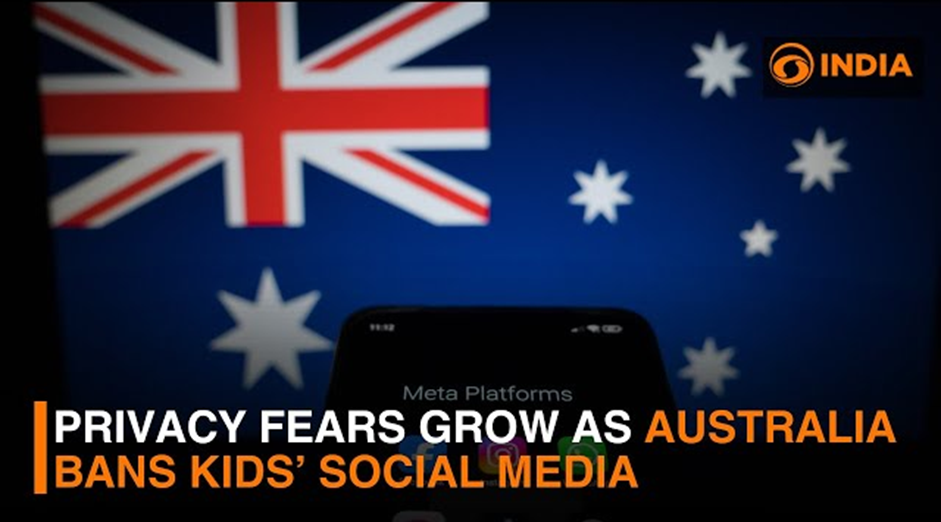- Courses
- GS Full Course 1 Year
- GS Full Course 2 Year
- GS Full Course 3 Year
- GS Full Course Till Selection
- CSAT
- 5 LAYERED ARJUNA Mentorship
- Public Administration Optional
- Online Program
- GS Recorded Course
- NCERT Batch
- Polity Module Course
- Geography Module Course
- Economy Module Course
- AMAC Module Course
- Modern India, Post Independence & World History Module Course
- Environment Module Course
- Governance Module Course
- Science & Tech. Module Course
- International Relations and Internal Security Module Course
- Disaster Management Module Course
- Ethics Module Course
- Essay Module Course
- Current Affairs Module Course
- ABOUT US
- OUR TOPPERS
- TEST SERIES
- FREE STUDY MATERIAL
- VIDEOS
- CONTACT US
India’s Gaming Addiction Laws and Australia’s Social Media Ban
India’s Gaming Addiction Laws and Australia’s Social Media Ban

- In recent years, governments around the world have become increasingly aware of the dangers children face in the digital world.
- With the rise of online gaming and social media, children are at risk of addiction, cyberbullying, exposure to harmful content, and online predators.
- Both India and Australia have introduced significant measures to protect their young citizens from these online dangers, though through different approaches—India focusing on gaming addiction, and Australia banning social media for children under 16.
India’s Steps to Address Online Gaming Addiction:
- The Government of India has recognized the risks associated with online gaming, especially the addiction it can cause among children.
- Online gaming addiction is becoming a growing concern and can lead to mental and physical health issues.
- To address this, several steps have been taken by different government ministries.
1. Information Technology (Intermediary Guidelines and Digital Media Ethics Code) Rules, 2021
The Ministry of Electronics and Information Technology (MeitY) introduced the Information Technology (Intermediary Guidelines and Digital Media Ethics Code) Rules, 2021 to regulate online platforms, including gaming websites, to reduce risks like addiction and harmful content.
Key Points of the IT Rules, 2021:
- The rules require online gaming platforms (like social media) to be careful about what they allow on their sites.
- They must make sure harmful or illegal content, like games that promote addiction or illegal activities, is not shared.
- Removal of Harmful Content: These platforms must quickly remove harmful content when they are informed or receive complaints. This includes content that:
- Can harm children (like addiction).
- Encourages illegal activities such as gambling or money laundering.
- Quick Action on Complaints: Platforms must take fast action to remove harmful content when complaints are received from users.
2. Advisory by the Ministry of Education on Online Gaming
The Ministry of Education has issued advisories to help parents and teachers understand the dangers of online gaming and addiction.
Key Advisories:
- Advisory on Overcoming Online Gaming Downsides (27th September 2021):
- Addiction Concern: This advisory warned about gaming addiction, which is now recognized as a gaming disorder.
- Advice for Parents and Teachers: The advisory recommended limiting gaming time and educating parents and teachers about the negative effects of excessive gaming.
- Addiction Warning: It said that without limits, children can easily become addicted to online games, which can lead to serious mental health problems.
- Advisory on Safe Online Gaming (10th December 2021):
- Further Warnings: This advisory also warned that unlimited online gaming can result in gaming disorder, causing stress and health issues for children.
- Steps to Take: Parents and teachers were urged to set clear rules and time limits for online gaming to keep children safe.
3. Guidelines on Online Gaming Advertisements by Ministry of Information and Broadcasting (MIB)
The Ministry of Information and Broadcasting (MIB) has set rules for controlling the way online games are advertised, especially to children.
Key Guidelines:
-
Advisory to TV Channels (4th December 2020):
- No Ads with Kids Under 18: Online gaming ads must not show children under the age of 18 playing games.
- Warning Labels: Every gaming advertisement must include a warning that says the game involves financial risk and could be addictive. This warning must be shown both in written form and in the audio or video.
- No False Claims: Ads should not suggest that gaming is a way to become more successful than others or a way to make money.
-
Ban on Online Betting Ads (21st March 2024):
- Ban on Gambling Ads: The MIB also told all media platforms to stop showing ads for online betting or gambling platforms.
- No Surrogate Advertising: The rules prevent these ads from being shown in a way that tricks people into thinking they are for something else, like a game.
4. Cyber Crime Prevention and Reporting Mechanisms
The Ministry of Home Affairs (MHA) has set up systems to handle cyber-crimes related to online gaming, such as addiction, online frauds, and other dangers.
Key Initiatives:
-
Indian Cyber Crime Coordination Centre (I4C):
- The MHA established I4C to help law enforcement agencies tackle cybercrimes, including those linked to online gaming addiction. It provides a system for responding to crimes quickly and efficiently.
-
National Cyber Crime Reporting Portal (https://cybercrime.gov.in):
- The government created this portal to allow people to report any type of cyber-crimes, including issues related to online gaming like fraud or addiction.
- Special Focus: The portal has special features for reporting crimes that involve women and children, or financial frauds. This helps ensure that gaming-related problems are reported and acted upon quickly.
Australian Parliament Bans Social Media for Children Under 16:
- In a similar effort to protect young people from the dangers of the internet, In November 2024, Australia became the first country in the world to pass a law banning social media use for children under the age of 16.
- This new law is aimed at protecting young people from online dangers, but it has also sparked some debate.
Key points of the Law
- Parliament Approval: The law was passed by both houses of the Australian Parliament.
- Senate Vote: The law passed in the Senate with 34 votes in favor and 19 against (Thursday).
- House of Representatives Vote: It was approved in the House with 102 votes in favor and 13 against (Wednesday).
- Amendments: The Senate made some changes to the law, which were agreed upon on 29 November 2024, before the law was officially passed.
-
Platforms Affected:
The law applies to social media platforms like:- TikTok, Facebook, Instagram, Snapchat, Reddit, X (formerly Twitter), and others.
- Fines for Companies:
- Social media companies can face fines up to 50 million Australian dollars (about $33 million) if they fail to stop children under 16 from signing up for accounts.
- The companies have one year to figure out how to implement the ban before penalties are enforced.
What the Government Says
-
Prime Minister’s Statement:
Prime Minister Anthony Albanese said the law was made to help parents who are worried about the harm children can face online, such as bullying or online predators. He stressed that social media companies now have a responsibility to protect kids.- Prime Minister Albanese: “Platforms now have a social responsibility to ensure the safety of our kids is a priority for them.”
-
Why the Law Was Needed:
The law aims to protect children from harmful content and prevent online abuse, which has become a growing problem.
Concerns and Criticisms
-
Privacy Issues:
Critics, especially from social media companies, are worried about privacy risks. Some fear that platforms could ask users for sensitive personal information (like passports or driver’s licenses) to verify their age.- Amendment: The law was changed to make sure platforms cannot ask for government-issued identification or use government systems to check users' ages.
-
Negative Impact on Vulnerable Children:
Some experts say that banning social media could have harmful effects on vulnerable children, such as those in regional areas or from the LGBTQI community, who use social media to connect with others and find support.- Senator David Shoebridge (Greens Party):
“This policy will hurt vulnerable young people the most, especially in regional communities and especially the LGBTQI community, by cutting them off.”
- Senator David Shoebridge (Greens Party):
Exemptions
The law does not apply to all online services. Some services used for education and healthcare are exempt. These include:
- YouTube (for educational content), Google Classroom, WhatsApp, Messenger Kids, and Kids Helpline.
Key Differences Between India and Australia’s Approaches
|
Aspect |
India’s Approach |
Australia’s Approach |
|
Target Issue |
Gaming addiction among children. |
Social media use by children under 16. |
|
Government Involvement |
Multiple ministries involved: MeitY, Ministry of Education, MIB, MHA. |
The Australian Parliament passed the law with wide support. |
|
Regulation |
Regulates online gaming platforms, advertisements, and content. |
Bans children under 16 from using social media platforms. |
|
Focus on Platforms |
Focus on gaming websites, ads promoting addiction, and content monitoring. |
Focus on social media platforms like Facebook, Instagram, and TikTok. |
|
Penalties |
Platforms face penalties for failing to remove harmful content. |
Social media platforms face up to AUD 50 million fines if children under 16 sign up. |
|
Exemptions |
No specific exemptions in current laws. |
Excludes educational and healthcare platforms (YouTube, Google Classroom). |
|
Parental Involvement |
Emphasis on educating parents and teachers about risks and prevention. |
No specific focus on parental guidance, but the law aims to help parents keep children safe. |
Must Check: Best IAS Coaching In Delhi
UPSC Prelims Result 2024 Out: Expected Cut Off & Other Details, UPSC Prelims 2024 Answer with Explanation, Daily Prelims Quiz, Daily Current Affairs, MONTHLY CURRENT AFFAIRS TOTAL (CAT) MAGAZINE, Best IAS Coaching Institute in Karol Bagh, Best IAS Coaching Institute in Delhi, Daily Mains Question Answer Practice, ENSURE IAS UPSC Toppers, UPSC Toppers Marksheet, Previous Year Interview Questions, UPSC Syllabus




